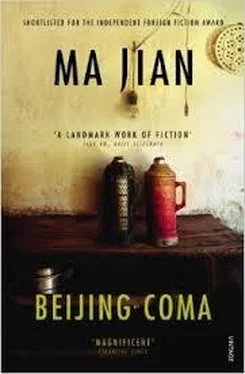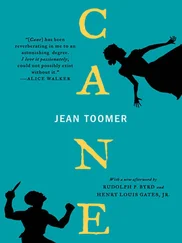‘I’m a biology student, and have taken courses in medicine, so I’m not easily shocked. But I just can’t imagine how anyone could bring themselves to eat another human being. My father told me that, of the three thousand rightists sent to the Gansu reform-through-labour camp, 1,700 died of starvation. Sometimes the survivors became so famished that they had to resort to eating the corpses.’
Dr Song walked over to the locked cabinet, picked up the two thermos flasks that were resting on top of it, gave them a shake, removed the stopper from one of them and poured some hot water into an empty cup. Then he brought out a small canister of tea, scooped out some leaves, dropped them into the hot water and placed a lid on the cup.
‘Thank you, thank you,’ I said, taking the cup from him. I wanted to swallow a large gulp, but the water was too hot.
‘Here in Guangxi it wasn’t starvation that drove people to cannibalism. It was hatred.’
I didn’t know what he meant.
‘It was in 1968, one of the most violent years of the Cultural Revolution. In Guangxi, it wasn’t enough just to kill class enemies, the local revolutionary committees forced the people to eat them as well. In the beginning, the enemies’ corpses were simmered in large vats together with legs of pork. But as the campaign progressed, there were too many corpses to deal with, so only the heart, liver and brain were cooked.’
I couldn’t believe what I was hearing.
I pictured my father’s body just before he died, and was relieved to think that it had been intact and unharmed.
‘There were so many enemies. If your father hadn’t been moved to Shandong, he would have got eaten in the end, too. How old are you? Nearly eighteen? Well you would only have been about two years old at the time, then… On 3 July 1968, Chairman Mao issued an order calling for the ruthless suppression of class enemies. He wanted all members of the Five Black Categories to be eliminated, together with twenty-three new types of class enemy, which included anyone who’d served as a policeman before Liberation, or who’d been sent to prison or labour camp. And not only them, but their close family and distant relatives as well.’
‘That’s a lot of people.’
‘Yes. Just think: the literal meaning of the Chinese characters for “revolution” is “elimination of life”. See this collection of books my research team has just brought out: Chronicles of the Cultural Revolution in Guangxi Province . Look, it says here that, in 1968, more than 100,000 people were killed in Guangxi Province. In Wuxuan County alone, 3,523 people were murdered, and of those, 350 were eaten. If I hadn’t been imprisoned in August of that year, I too might have been killed.’
The ten volumes were stacked neatly on the small wooden shelf. They looked much heavier than my mother’s volumes of Mysteries of the World .
‘So who were the murderers?’
‘Who were the murderers? You could argue that the only real murderer was Chairman Mao. But the fact is, everyone was involved. On 15 June 1968, a public struggle meeting was held here in Wuxuan, during which thirty-seven former rich peasants were killed. After they were publicly denounced, they were made to stand in line, and were then beaten to death one after the other. When a peasant called Li Yan, standing second in line, saw the man in front of her being attacked with metal rods and howling out in pain, she broke free and tried to run back to her house. But the crowds that had gathered to gawk at the public beatings ran after her, and pelted her with bricks and rocks. She died in the doorway of a house not far from hers. It’s on that main street you must have walked down after you left the bus station. They’d branded her a rich peasant, but all she owned was three cows. You ask me who the murderers were. The answer is: everyone! Our neighbours, our friends across the street.’
‘We’ve got a girl called Li Yan in our class,’ I muttered distractedly.
‘After Li Yan was killed, her children and parents were murdered as well. Her whole family was wiped out. During those years, the PLA soldiers sent to Wuxuan County were stationed here in Wuxuan Town. They were meant to carry out the executions, and the inhabitants of the surrounding villages were only supposed to make the arrests. But the villagers were eager to show their commitment to the revolution, so they took things into their own hands, and started executing the class enemies themselves. Look at this passage. It’s a speech that was given by the director of the Wuxuan Revolutionary Committee at the time: “. . The masses at the grass roots of society are permitted to carry out executions, but they shouldn’t waste bullets. Instead, they should be encouraged to beat the enemies to death with their own hands, or with the aid of stones or wooden sticks. This way, they will be able to draw greater educational benefit from the experience.” When your father was sent down here, there were about a thousand people incarcerated on the farm. After a couple of years, the hundred or so rightists among them were transferred to other camps. Of the nine hundred labourers who remained, over a hundred belonged to the twenty-three undesirable types. All of them were killed. The corpses of the few who’d contracted diseases were buried, but the rest of them were eaten.’
‘You’re a doctor. What are you doing working here?’ All I wanted was for him to close the huge book in his hand.
‘This is just a temporary post. Once I’ve finished overseeing this project, I’ll be sent back to the hospital. I wish I could get transferred somewhere else, though. It was very difficult returning to the hospital after my release. My mind kept flashing back to the summer day in 1968, when I watched the hospital staff line up the head, deputy head, and twenty of the best surgeons, gynaecologists, pharmacists and nurses against the wall and bludgeon them to death with bricks and metal rods. I saw our laboratory technician, Wei Honghai, lying on the ground. His head was smashed open, but his limbs were still shaking. A PLA soldier walked over and finished him off with a shot to the chest. They didn’t like using guns back then. Whenever they shot someone, the victim’s family was made to pay for the bullet.’
‘So where were all those people buried?’ I didn’t want to prolong this conversation, but I couldn’t find a way to change the subject.
‘No one wanted to collect the corpses. When relatives of the dead were seen to cry, they were murdered for “sympathising with bad elements”. A woman called Wang Fangfang from Wuling Village flung herself onto her husband’s corpse after he was murdered and burst into tears. She had a young baby tied to her back. The peasants beat Fangfang to death, then hit the baby with a metal spade. Hundreds of people were killed during those months. The streets and rivers were strewn with corpses. There were flies everywhere. It was horrible.’
‘A hundred thousand people were murdered in this province, and no one tried to stop it?’
‘No. Sometimes, when the militia grew tired of carrying out the killings, they forced the class enemies to kill one another. Listen to this passage about Daqiao District: “After the struggle meeting, it was decided that the bad elements locked in Building Four of the commune should be killed. The bad elements were immediately tied up with rope and led to a disused coal mine 300 metres away. They were made to stand in a queue and push the person in front of them into a pool of water that was 10 metres deep. When the bad elements resisted, the cadres and militia took control, and started pushing them in themselves. One of the women had lived on a boat and knew how to swim. After she was pushed into the water, she was able to swim to the other side, so the cadres had to hurl rocks at her. In the end, a militiaman pulled her out and stabbed her in the neck…”’
Читать дальше












